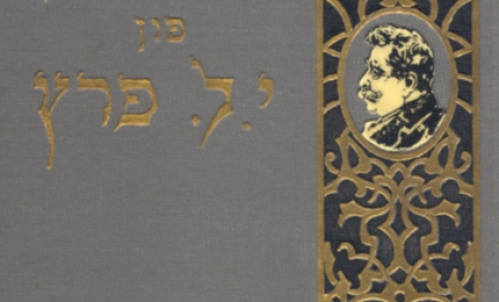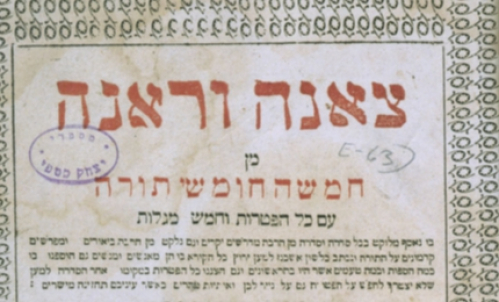Jewish Museums in the 21st Century
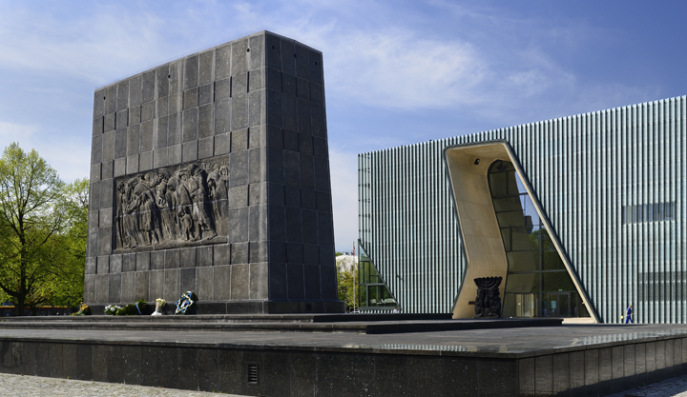
|
Symposium
2:00pm – 5:00pm Admission: $12 |
Presented by YIVO, Center for Jewish History, American Jewish Historical Society, Yeshiva University Museum, The Jewish Museum, East European Jewish Affairs, University of Colorado Boulder Program in Jewish Studies, and Routledge Press.
Today, Eastern Europe is experiencing a boom in Jewish museums, paradoxically in the near absence of Jews. How do they represent Jewish history, and what explains the increasing interest in Jewish culture by non-Jews? Join culture critics, scholars, and museum practitioners to discuss the state of Jewish museums in both Europe and the U.S. and why they matter.
Schedule
Panel I
Introduction: Jonathan Brent, Executive Director, YIVO Institute for Jewish Research
Olga Gershenson, The Jewish Museum and Tolerance Center in Moscow
Barbara Kirshenblatt-Gimblett, POLIN Museum of the History of Polish Jews
Anna Manchin, Jewish Museums in Hungary
Ruth Ellen Gruber, Jewish Exhibitions and Synagogue Restorations in the Czech Republic
Moderator: David Shneer, Editor in Chief, East European Jewish Affairs
Coffee Break
Panel II
Introduction: Jacob Wisse, Executive Director, Yeshiva University Museum
Edward Rothstein, Cultural Critic at the Wall Street Journal
Norman Kleeblatt, Susan and Elihu Rose Chief Curator at the Jewish Musuem, New York
Pamela Nadell, Chair of the Department of History and Director of the Jewish Studies Program, American University and Advisor to the National Museum of American Jewish History
Benjamin Nathans, Ronald S. Lauder Associate Professor of History at the University of Pennsylvania
Moderator: Barbara Kirshenblatt-Gimblett
Reception
For more information visit cjh.org/jewishmuseums.
Presented in honor of the Fall/Winter issue of the journal East European Jewish Affairs, “New Jewish Museums in Post-Communist Europe." Guest co-editors: Barbara Kirshenblatt-Gimblett, Director of the Permanent Exhibition at POLIN Museum of the History of Polish Jews, and Olga Gershenson, Professor of Judaic and Near Eastern History at the University of Massachusetts, Amherst.
About the Participants

Olga Gershenson is Professor of Judaic and Near Eastern Studies at the University of Massachusetts Amherst, where she is also on the Film Studies faculty. A multi-disciplinary scholar, her interests lie at the intersection of culture, history, and film. Her first book, Gesher: Russian Theater in Israel (Peter Lang International Academic Publishers), pioneered the study of Russian immigrant cultural production and her latest book, The Phantom Holocaust (Rutgers University Press), reveals unknown Holocaust films from the Soviet Union. In her most recent work, Gershenson looks at Jewish museums in post-communist Europe, examining the relationship between space, politics, history, and culture.
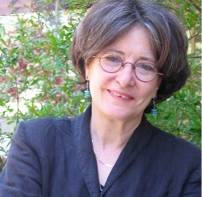
American author and journalist Ruth Ellen Gruber has chronicled Jewish developments in Europe for more than 25 years and writes frequently on Jewish heritage, revival and tourism. With her book Virtually Jewish: Reinventing Jewish Culture in Europe (University of California Press), she coined the term “Virtually Jewish” to describe the way the so-called “Jewish space” in Europe is often filled by non-Jews. A former correspondent for UPI in Poland and elsewhere in Europe, she is Senior Europe correspondent for JTA and has written for the New York Times and other publications. Her awards and honors include a Guggenheim Fellowship and Poland’s Knight's Cross of the Order of Merit. Currently she coordinates the web site www.jewish-heritage-europe.eu, a project of the Rothschild Foundation Europe.

Barbara Kirshenblatt-Gimblett is Chief Curator of the Core Exhibition and Advisor to the Director at POLIN Museum of the History of Polish Jews in Warsaw. She is distinguished University Professor Emerita and Professor Emerita of Performance Studies at New York University. She has been honored with an award for lifetime achievement by the Foundation for Jewish Culture, the Mlotek Prize for Yiddish and Yiddish Culture, the Marshall Sklare award for her contributions to the social scientific study of Jewry, an honorary doctorate from the Jewish Theological Seminary of America, and most recently the Order of Merit of the Republic of Poland from the President of Poland for her contribution to the creation of POLIN Museum. She is a member of the board of the Association of the Jewish Historical Institute of Poland and currently serves on advisory boards for the YIVO Institute for Jewish Research, Council of American Jewish Museums, Vienna Jewish Museum, Berlin Jewish Museum, and Jewish Museum and Tolerance Center in Moscow.

Norman Kleeblatt is known for his well-crafted and broad ranging exhibitions. His 2008 award-winning show for The Jewish Museum, "Action/Abstraction: Pollock, De Kooning, and American Art, 1940-1976" is an example of not only his rethinking of art and cultural history, but also of exhibition models. Kleeblatt’s other noteworthy exhibitions include "The Dreyfus Affair: Art, Truth and Justice" (1987); "Too Jewish? Challenging Traditional Identities" (1996); "John Singer Sargent: Portraits of the Wertheimer Family" (2000). In 2014, he organized “Mel Bochner: Strong Language” and co-curated the exhibition “From the Margins: Lee Krasner | Norman Lewis, 1945-1952”. His articles have appeared in Artforum, Art in America, the Art Journal, and Art News. He was a recipient of support from the Getty Research Institute, the National Endowment for the Arts, the National Endowment for the Humanities, and the Rockefeller Foundation, and currently serves on the boards of both the Vera List Center for Art and Politics of the New School and the U.S. section of the International Association of Art Critics (AICA).
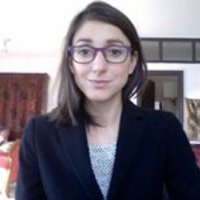
Anna Manchin has a Ph.D. in Modern European History from Brown University (2008). She has held the Ray D. Wolfe Post-Doctoral Fellowship in Jewish Studies at the University of Toronto (2009), the Aresty Visiting Fellowship in Jewish Studies at Rutgers University (2011), the Prins Post-Doctoral Fellowship at the Center for Jewish History in New York (2012-2014), the Fred and Ellen Lewis Fellowship at the Joint Distribution Committee Archives in Jerusalem, and the Tamop/EU Post-Doctoral Fellowship at the Institute for Social and European Studies in Kőszeg, Hungary (2015). Her research interests are 20th century East European nationalism, gender and Jewishness in popular and visual culture.
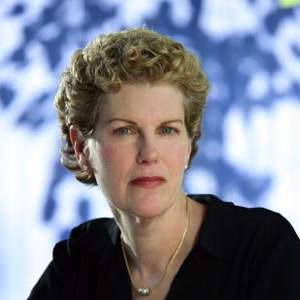
Pamela S. Nadell holds the Patrick Clendenen Chair in Women’s and Gender History and is Chair of the Department of History and Director of the Jewish Studies Program at American University. In 2007, she received American University’s highest faculty award, the Scholar/Teacher of the year, and in 2010 she received the Lee Max Friedman Award from the American Jewish Historical Society for distinguished service to the profession. The author or editor of seven books, her most recent book is Making Women’s Histories: Beyond National Perspectives (NYU Press). Professor Nadell is president of the Association of Jewish Studies and past chair of the Academic Council of the American Jewish Historical Society. She was a member of the founding historians’ team of the National Museum of American Jewish History and her consulting work for museums includes the Library of Congress and Beit Hatfusot: The Museum of the Jewish People.

Benjamin Nathans, the Ronald S. Lauder Associate Professor of History at the University of Pennsylvania, chaired the committee of scholars hired by Ralph Appelbaum Associates to help design the Jewish Museum and Tolerance Center in Moscow, which opened in 2012. His prize-winning book, Beyond the Pale: The Jewish Encounter with Late Imperial Russia (University of California Press), has been translated into Hebrew and Russian. Nathans’ essays have appeared in The Nation, the London Review of Books, and other publications. He is currently completing a book entitled To the Success of Our Hopeless Cause: A History of the Soviet Dissident Movement.

Edward Rothstein is Critic at Large for The Wall Street Journal where he writes about museums, books, the arts and ideas. He is also a regular contributor to Mosaic Magazine. For twenty years, he was Critic at Large for The New York Times, where he wrote about museum exhibitions, the arts and ideas; he also served as the paper’s Chief Music Critic. He was elected to the American Academy of Arts and Sciences in 2013. He is the author of Emblems of Mind: The Inner Life of Music and Mathematics (University Of Chicago Press).

David Shneer is the Louis P. Singer Endowed Chair in Jewish History, Professor of History, Religious Studies, and Jewish Studies and 2015-2016College Scholar at the University of Colorado, Boulder. He is a Distinguished Lecturer for the Association for Jewish Studies. In Fall 2015, he will serve as a visiting scholar at the University of Southern California's Visual Studies Research Institute. He maintains a blog at the Radical Jewish Traveler.
